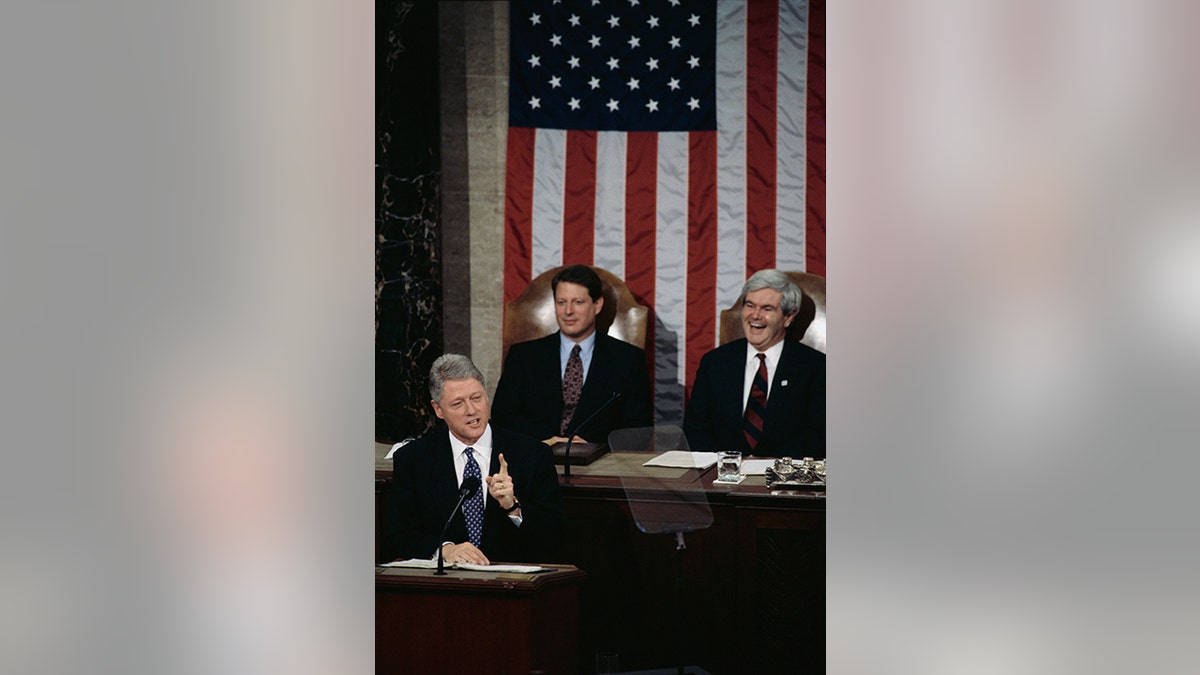Gingrich warns Freedom Caucus to study his era as conservatives issue demand letter following Johnson vote
Newt Gingrich engineered the Contract With America after forming the Conservative Opportunity Society, which some compare to today's Freedom Caucus.

Former Speaker Newt Gingrich, who led Republicans to their first House majority in four decades in 1994, said Saturday the House Freedom Caucus should recall how his own caucus led conservatives to power within the party.
Gingrich tweeted that he and other conservatives had developed "positive action principles" in 1983 as part of what they called the Conservative Opportunity Society.
"[Those] led 11 years later to the Contract with America and the first GOP House Majority in 40 years."
"If the Freedom Caucus would study them, they could be dramatically more effective," Gingrich said, going on to cite and agree with a sentiment from political reporter Mark Halperin’s "Wide World of News" newsletter.
"[T]he Freedom Caucus is a bunch of rebels with a series of causes but no coherent path to achieving said causes," Halperin wrote.
In the 1980s, although Ronald Reagan was in the White House, Boston Democratic Speaker Tip O’Neill wielded strong control of the House. O’Neill and Reagan had a notably friendly but ideologically disparate relationship.
Coinciding with the early days of C-SPAN televising live floor proceedings, Gingrich would often take to the well of the House in the late-night hours and address conservatives’ issues to a mostly empty chamber but with a captive audience on the new TV format.
GINGRICH BLASTS HARRIS' ‘RAMBLING’ SPEECHES
Gingrich biographer Craig Shirley told Fox News Digital on Saturday that the Freedom Caucus should study the work of their comparative predecessor, the Conservative Opportunity Society, as well as the path Gingrich led from a low-profile congressman to speaker.
"I guess the word brilliant is thrown around so, so cavalierly. So let me just say, it was extremely smart politics to make the case for conservative governance," Shirley said of Gingrich’s work in the 1980s and 1990s.
"Reagan had already blazed that path eight years before Gingrich did."
While critics say the GOP has shifted hard to the right on some issues and softened on others, Shirley said it’s essentially the same as it was during Gingrich’s rise.
"Less government, more freedom, less taxes, strong national defense, pro-life."
Former Rep. Vin Weber, R-Minn., another top member of Gingrich’s conservative group, said in a PBS interview that there have not been too many groups like the Conservative Opportunity Society (or the Freedom Caucus, which hadn’t been formed at the time of the interview) and that there was the same issue with apprehension over angering their party leaders.
Weber said there had been a few small intra-caucus conservative groups prior to the Reagan era, including one in the 1960s led by then-Rep. Donald Rumsfeld, R-Ill. – who would go on to serve as Pentagon chief two times.
On the last day of the 1982 session, Gingrich approached Weber and asked, "What are you doing next year and for the next 10 years after that?."
"I thought that was interesting and I said, ‘I expect to be back here, but nothing special other than that,’" Weber recalled.
"What he was saying was that he, as one person, was not being effective…. He identified me in the [GOP] conference as somebody [who] had been supportive of his point of view and maybe had some ability to organize things," Weber said.
MIKE JOHNSON RE-ELECTED HOUSE SPEAKER
Shirley said the current Freedom Caucus has the rare opportunity to achieve their goals if they play their cards right, with full Republican control of Washington.
"They don't have a ‘contract,’ but they have the next best thing there. They have a core set of issues and an ideology that they can easily follow," he said, adding that "no one should ever doubt" Speaker Mike Johnson’s commitment to "Reaganite" principles.
In additional comments to Fox News’ "Hannity," Gingrich said the one-round vote Friday was a "great victory" for Johnson, R-La.
"[He’s] just a decent, hardworking, intelligent human being.… I could not have been the kind of speaker he is. I don't have the patience. I don't have that ability to just keep moving forward. It's really very extraordinary."
Meanwhile, Freedom Caucus member Ralph Norman, R-S.C., told Fox News the group met with Johnson earlier and that he "just didn't come away with the feeling that the ‘umph’ or the willingness to fight for Trump's agenda was there."
"And I use as a backdrop what’s happened the last 14 months, we had 1500-page omni-bills that you couldn’t read – where you had no spending cuts to offset $100 billion in new spending."
"And I know we had a slim majority, but that's over with now. What we wanted to impress with [Johnson] yesterday was, are you going to fight for these things that we've been asking for, like a balanced budget? Like offsets? Like getting behind all of the Trump agenda?"
Norman, along with Rep. Keith Self, R-Texas, initially did not vote for Johnson, which would have set up a second round of speaker votes.
But, Norman told "The Story" that that action was the "only way to let my voice be heard."
He said Johnson "gave his word" to fight for the things he mentioned to Fox News, and that agreement, plus a message from Trump that Johnson was the only speaker candidate with support in the caucus, guided his decision to ultimately support the Louisianan.
In a "Dear Colleague" letter released Friday, House Freedom Caucus Chairman Andy Harris, R-Md., and his members expressed several policy points that Johnson should commit to in order to "reverse the damage of the Biden-Harris administration," as well as achieve long-standing conservative goals.
The letter indicated they had voted for Johnson because of their "steadfast support" of Trump and ensuring the Jan. 6 elector certification can run smoothly.
"We did this despite our sincere reservations regarding the Speaker’s track record over the past 15 months."
The caucus called for Johnson to modify the House calendar so its schedule is as busy as the Senate’s, ensure reconciliation legislation reduces spending and deficits in "real terms," and halt violations of the "72-hour-rule" for debate on amendments to bills.
CLICK HERE TO GET THE FOX NEWS APP
They also demanded Johnson not rely on Democrats to pass legislation that a majority of his own caucus won’t support.
In comments on "The Story," Norman said he believes Johnson now understands – through the initial silence of several Republicans during the first roll call and his and Self’s initial non-Johnson-vote – that he will have to work to consider the conservative bloc’s demands.


